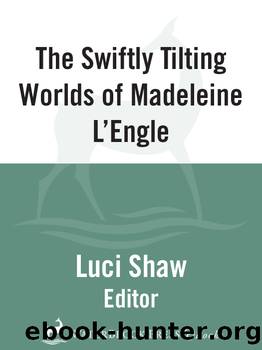The Swiftly Tilting Worlds of Madeleine L'Engle by Luci Shaw

Author:Luci Shaw [Shaw, Luci]
Language: eng
Format: epub
ISBN: 978-0-307-78180-2
Publisher: The Crown Publishing Group
Published: 2013-10-09T00:00:00+00:00
What Milton suggests through Raphael, and what Bunyan points up in the rhymed preface, are concerns for those artists who are Christians to show through metaphorâand through an incarnational actâhow Christian belief informs their art. Two poets, one from the seventeenth century and one from the nineteenth, may help readers understand more fully the glory of metaphor and the beauty and power of art as incarnation in poetry.
The poet-priest of Bemerton, England, George Herbert of the seventeenth century, writes a body of poems which poetically argue his indebtedness to the Bible. Almost every aspect of his poetry particularly demonstrates the influence of wisdom literature, the Psalms, the parables of Christ, and Pauline writings. To see these influences is not to deny that Herbert conceives of poetry in Richard Hughesâs terms as âa miniature version of the Incarnation.â5 While Herbert rarely uses the actual term incarnation, there is no question regarding his beliefs and feelings about the ramifications of this important Christian doctrine. Perhaps it is helpful or interesting to know, however, that although the Incarnation embraces the birth, the ministry, and the death of Christ, Herbert gives greatest emphasis to the passion and death of Christ. Obviously for Herbert, the passion and death is the central activity of the redemptive process.6
This poet does not ignore the nativity or the life and ministry of Christ; at the same time, his poetry suggests that the Incarnation never fails to provide him with subject or form and meaning. In a poem with a subject which he rarely uses, I should like to study Herbertâs poetry as incarnation. In his poem âChristmasâ he writes of a strayed rider who arrives at an inn where the Host not only receives him, but waits for any traveler in need of help. The poet soon evokes the Nativity scene, which embodies one who âWraptâ in nightâs mantle, stole into a manger.â What one perceives is one strayed rider who becomes a metaphor for all strayed riders. It is of special interest that when the strayed rider alludes to the Nativity, he does so across the âdistance of the centuries,â with the cross and the tombâindeed the whole Christian storyâingrained on his mind, and as ingrained as the manger in the inn.
To read even a few poems by Herbert is to recognize that the Christian doctrine of the Incarnation cannot be limited to the small number of his poems whose explicit subject is the Incarnation itself; rather, his sense of the Incarnation, its embodiment of the entire Christian story, pervades his poetry, and each poem that he writes is a celebration of the Incarnation. It is equally clear that Herbertâs âheaven in ordinaireââan important phrase from his poem âPrayerââcomes very close to a formulation of the poetâs view of metaphorical language and a fuller view of the way he envisions the implications of the Incarnation. This means language that never takes one out of everyday reality but drives a reader more deeply into reality. When he selects ordinary
Download
This site does not store any files on its server. We only index and link to content provided by other sites. Please contact the content providers to delete copyright contents if any and email us, we'll remove relevant links or contents immediately.
The Power of Myth by Joseph Campbell & Bill Moyers(1056)
Half Moon Bay by Jonathan Kellerman & Jesse Kellerman(979)
Inseparable by Emma Donoghue(976)
A Social History of the Media by Peter Burke & Peter Burke(968)
The Nets of Modernism: Henry James, Virginia Woolf, James Joyce, and Sigmund Freud by Maud Ellmann(891)
The Spike by Mark Humphries;(809)
The Complete Correspondence 1928-1940 by Theodor W. Adorno & Walter Benjamin(776)
A Theory of Narrative Drawing by Simon Grennan(774)
Culture by Terry Eagleton(770)
Ideology by Eagleton Terry;(731)
World Philology by(712)
Farnsworth's Classical English Rhetoric by Ward Farnsworth(711)
Bodies from the Library 3 by Tony Medawar(707)
Game of Thrones and Philosophy by William Irwin(707)
High Albania by M. Edith Durham(698)
Adam Smith by Jonathan Conlin(686)
A Reader’s Companion to J. D. Salinger’s The Catcher in the Rye by Peter Beidler(675)
Comic Genius: Portraits of Funny People by(649)
Monkey King by Wu Cheng'en(646)
